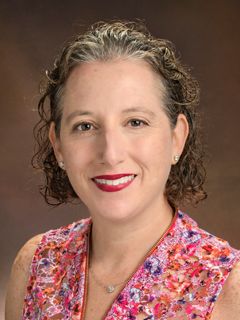HOW CAN WE HELP YOU? Call 1-800-TRY-CHOP
In This Section
Web-based Mitochondrial Resource, 2024 Tandem Meetings, Food Allergen Exposure, STAT Madness

We are roaring into March with the announcement of STAT Madness competitors from Children's Hospital of Philadelphia. This week's news also features a new web-based tool designed to help clinicians identify genome variants in mitochondrial disease, and a medication that may help protect children from accidental exposure to food allergies. CHOP researchers also presented an abstract on extramedullary disease and response to CAR T-cell therapy at the 2024 Tandem Meetings.
Web-based Tool Analyzes Genome Variants of Mitochondrial Disease Specific to Individual Patients
Together with a team from Children's Hospital Los Angeles, researchers from CHOP designed a web-based resource that is first of its kind, specific to the special characteristics of mitochondrial disease. MSeqDR Quick-Mitome (QM), which analyzes raw exome and genome datasets, offers automated variant interpretation that also considers the dual genome nature of primary mitochondrial diseases.
"While hundreds of causal genes across both nuclear and mtDNA genomes have already been identified to cause primary mitochondrial disease, many more are discovered every year," said Marni Falk, MD, senior co-study author and director of Mitochondrial Medicine, a Frontier program at CHOP.
The web platform represents a significant step forward in analyzing genomic datasets in the context of individual primary mitochondrial disease patients. It allows researchers to upload and query existing genomic data for their individual patients and then consider the potential relevance to their diseases of the variants prioritized by machine learning in both known and novel disease genes.
Researchers developed the Mitochondrial Disease Variant Classifier, to use in conjunction with QM. Study results, published in Current Protocols, indicated that the classifier correctly identified more than 98% of variants. It also predicted primary mitochondrial disease-causing variants with 94% precision, based on performance benchmarks.
Learn more in this CHOP press release.
Medical Director of CHOP Outpatient Oncology Presents at 2024 Tandem Meetings
Susan Rheingold, MD, member of the Hematologic Malignancy and Cellular Therapy groups at CHOP, presented research findings at the 2024 Tandem Meetings: Transplantation & Cellular Therapy Meetings of ASTCT and CIBMTR. Held in San Antonio, Texas from Feb. 21 to 24, the conference hosted presentations on cutting-edge science from international leading experts in hematopoietic cell transplantation and cellular therapy.
Dr. Rheingold discussed findings that revealed high bone marrow disease burden (BM) is an important prognostic factor for poor long-term outcomes after chimeric antigen receptor (CAR) T-cell therapy for patients with central nervous system (CNS) and non-CNS extramedullary disease (EMD) involvement in relapsed/refractory B-cell acute lymphoblastic leukemia (B-ALL). EMD is when leukemia is found outside the bone marrow or central nervous system and, in multiply relapsed patients, leukemia found in unusual sites, including the eye, breast, bones, liver and kidneys, becomes more common. Patients with CNS and EMD sites did respond to CAR T-cell therapy.
Representing a study team of clinicians from CHOP, Seattle Children's, and the Children's Hospital of Los Angeles as part of the Consortium for the Advancement of Research Methods and Analysis, Dr. Rheingold suggested a need for new assessments for CNS or EMD involvement during pre-CAR T evaluations to improve clinical care and response to relapse after CAR T-cell therapy.
The American Society for Transplantation and Cellular Therapy (ASTCT) is dedicated to improving the application and success of blood and marrow transplantation and related cellular therapies. The Center for International Blood and Marrow Transplant Research (CIBMTR) is a research collaboration between the National Marrow Donor Program/Be The Match and the Medical College of Wisconsin that strives to advance hematopoietic cell transplantation and cellular therapy worldwide to increase survival and enrich quality of life for patients.
Learn more about the study in this CGTlive news brief.
Omalizumab May Help Protect Patients From Accidental Exposure to Food Allergens
CHOP served as one of the clinical trial sites that led to the Food and Drug Administration's Feb. 16 approval of omalizumab for the reduction of allergic reactions.
"Accidental exposure to a food allergen is one of the most common concerns among parents of children with food allergies," said Jonathan Spergel, MD, PhD, co-leader of the Food Allergy Center at CHOP and co-author on the study. "This medication provides families with an additional option to help reduce the impact of an allergic reaction."
Dr. Spergel was co-author of a study published in the New England Journal of Medicine that revealed a 16-week course of treatment with omalizumab increased the amount of peanut, tree nuts, egg, milk, and wheat that children as young as 1 year old with multi-food allergies could consume without an allergic reaction.
Nearly 67% of study participants who completed treatment with omalizumab could consume a single dose of 600 mg or more of peanut protein, which is about two and half peanuts, without experiencing a moderate or severe allergic reaction. Researchers identified similar outcomes for the consumption of egg, milk, wheat, cashew, walnut, and hazelnut with a threshold of 1,000 mg of protein or more. Although the medication does not cure food allergies, it has the potential to protect children and teens from accidental exposure to allergens.
Read more in this CHOP news release.
Cheer on CHOP by Voting for Two Studies in STAT Madness
Ready your (computer) mice and rally your support for STAT's annual STAT Madness challenge. Alongside high potential for impact, the top 64 selected studies represent strong scientific rigor and originality, and this year two CHOP studies have been selected to compete. These innovative biomedical studies are bracketed against each other March Madness style until one winner remains.
In Vivo Editing of Blood Stem Cells
A scientific team of CHOP and University of Pennsylvania investigators developed a proof-of-concept model for delivering gene editing tools to the bone marrow to treat blood disorders, allowing for in vivo cellular reprogramming and providing a new and potentially safer way of controlling hematopoietic stem cells (HSC) fate by correcting genetic defects — potentially avoiding the need for stem cell transplants that require patients to receive toxic chemotherapy or radiation. If translated into the clinic, this approach could expand access and reduce the cost of gene therapies for blood disorders.
Working to make this new treatment a reality are investigators Stefano Rivella, PhD; Laura Breda, PhD; and Michael Triebwasser, MD, PhD, from CHOP, together with Hamideh Parhiz, and Tyler Papp, PhD, at the University of Penn, and Drew Weissman, MD, PhD, director of the Penn Institute for RNA Innovation.
"This is a medicine of the future," Dr. Rivella said.
Learn more about the nominated study in this CHOP press release.
Treating Vascular Anomalies
Malformations or tumors of the blood or lymphatic vessels can be life-threatening, but their diagnosis and the selection of appropriate targeted therapies is often impeded by difficulty getting a good sample for genetic testing. Researchers from CHOP and the Eunice Kennedy Shriver National Institute of Child Health and Human Development developed a liquid biopsy and other novel noninvasive approaches. When combined with deep DNA sequencing, the research team made genetic diagnoses in 72% of patients, leading to the start of new medications in 63% and improvement in most patients.
Researchers from CHOP include senior authors Denise Adams, MD, co-principal investigator of the Frontier Vascular Anomalies Program and director of the Comprehensive Vascular Anomalies Program; Yoav Dori, MD, PhD, pediatric cardiologist and director of the Pediatric Lymphatic Imaging and Interventions and Lymphatic Research; and Hakon Hakonarson, MD, PhD, director of the Center for Applied Genomics and co-principal investigator of the Frontier Vascular Anomalies Program.
"This method is absolutely transformative for the field," Dr. Hakonarson said. "It's being performed at an unprecedented sequencing depth that we have mastered at CHOP. We are resolving more samples every day to help guide treatment of patients we previously could not."
See CHOP News for more information on this study.
The first round of voting opens today, March 1.
ICYMI
Catch up on our headlines from our Feb. 16 In The News:
- Madeline Bell Named CEO of the Year
- Matthew Weitzman, PhD, Elected to the American Academy of Microbiology
- NCCN Releases Its First-Ever Guidelines for Neuroblastoma
- Polysubstance Use and Sexual Partnership Factors May Increase Risk of HIV in Youth
- CHOP 'Research Hero' Now Works Alongside Surgeon Who Treated Him
- Mitigating Financial Stress May Reduce Child Welfare Involvement for Low-Income Families
Keep up with our news, stories, and updates in real time by following us on X, Facebook, LinkedIn, or Instagram. Meet the minds behind the science in the Bench to Bedside podcast. Or subscribe to our newsletter to receive an email every other Friday by signing up here.







